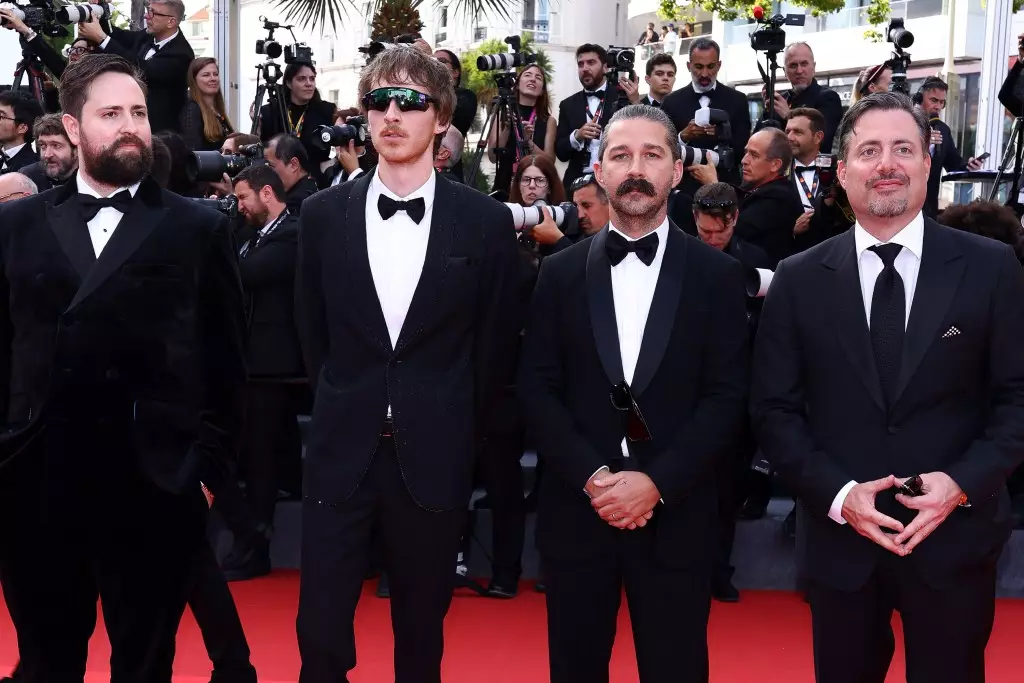“Slauson Rec,” the documentary centered around actor Shia LaBeouf’s ambitious free theater company in South Los Angeles, presents a compelling yet challenging view of creativity under duress. LaBeouf, known for his acclaimed roles in major films, is portrayed far removed from his glamorous Hollywood image. Instead, we see a man grappling with the weight of leading a collective of untrained actors, where frustration often erupts into chaotic displays of emotion — shouting, chair-throwing, and dramatic exits become the norm. This is not just art imitating life; it’s a raw exploration of the struggle buried within the artistic process itself.
Indeed, the documentary doesn’t shy away from revealing LaBeouf’s vulnerabilities. Director Leo Lewis O’Neil captures candid moments of distress, leading LaBeouf into a position that, while noble in intent, spirals into overwhelming chaos. It feels almost voyeuristic to witness this unraveling; the camera doesn’t flinch from the turmoil that emerges when passion meets adversity. While some might argue that such an unfiltered depiction can tarnish an artist’s reputation, it offers a refreshing honesty that the entertainment industry often glosses over.
The Burden of Leadership
O’Neil’s decision to retain the more tumultuous moments speaks volumes about both his integrity as a filmmaker and LaBeouf’s willingness to expose his authentic self. There’s strength in laying bare one’s flaws, particularly in a time when social media constantly pressures individuals to curate perfect personas. When LaBeouf insisted that O’Neil keep the raw footage, he showcased a rarity in Hollywood—a powerful acknowledgment of human fragility. The narrative becomes one of vulnerability, portraying the actor not merely as a star caught in the limelight but as a flawed, striving individual.
However, it begs the question: how much of this artistic project was truly about community building and how much became a manifestation of LaBeouf’s internal struggles? According to producer Matt Zien, LaBeouf had “noble intentions,” but it’s evident that he perhaps underestimated the emotional labor of guiding a group of novice actors. This miscalculation raises an essential discussion about the responsibilities leaders in creative environments hold. Are they tasked solely with fostering talent, or must they also grapple with their personal demons in the process?
Slauson Rec: A Reflection of Loneliness
The film also touches on a deeper theme of isolation and companionship. LaBeouf’s revelations about loneliness resonate profoundly; for him, creating this theater company was as much about artistic exploration as it was about constructing a familial bond. In his quest for community, he inadvertently unearthed his own fragility. The powerful juxtaposition of camaraderie and conflict amplifies the emotional stakes of the documentary. Watching LaBeouf interact with his students, it becomes apparent that their challenges mirror his own—navigating the fragile line between aspiration and anxiety.
There’s a raw beauty to the theater project that goes beyond playwriting and performance; it becomes a microcosm of human connection. In a world where the glitz of fame often overshadows earnestness, “Slauson Rec” shines a light on the importance of authentic interactions. Yet, it also poses critical questions. Was this an authentic connection borne from creativity, or merely an escape route for a troubled soul seeking solace in artistic chaos?
The Dichotomy of Intent and Reality
The heart of “Slauson Rec” lies in its exploration of intent versus reality. Could it be that what was conceived as a heartwarming artistic venture became a breeding ground for tension and emotional volatility? As Zien aptly noted, LaBeouf “bit off more than he could chew,” suggesting that ambition, when untethered from pragmatic grounding, can lead to spiraling consequences—a lesson many creative minds unfamiliar with the complexities of group dynamics often learn too late.
The sheer amount of footage—800 hours—welcomes the audience to piece together not only LaBeouf’s story but also the larger dialogue about how the arts demand more than talent. They require navigation through personal chaos, ideological clashes, and emotional turmoil. In this context, “Slauson Rec” transforms from a mere documentary into a poignant exploration of the human experience—unfiltered, messy, and potent in its honesty.
As “Slauson Rec” premiered in the esteemed Cannes Classics section, it affirmed that the value of art often lies not in its perfection but in its ability to provoke thought and evoke empathy. In shedding light on LaBeouf’s tumultuous journey, the documentarians have gifted audiences an introspective mirror, reflecting the complicated tapestry that is both artistry and connection.


Leave a Reply